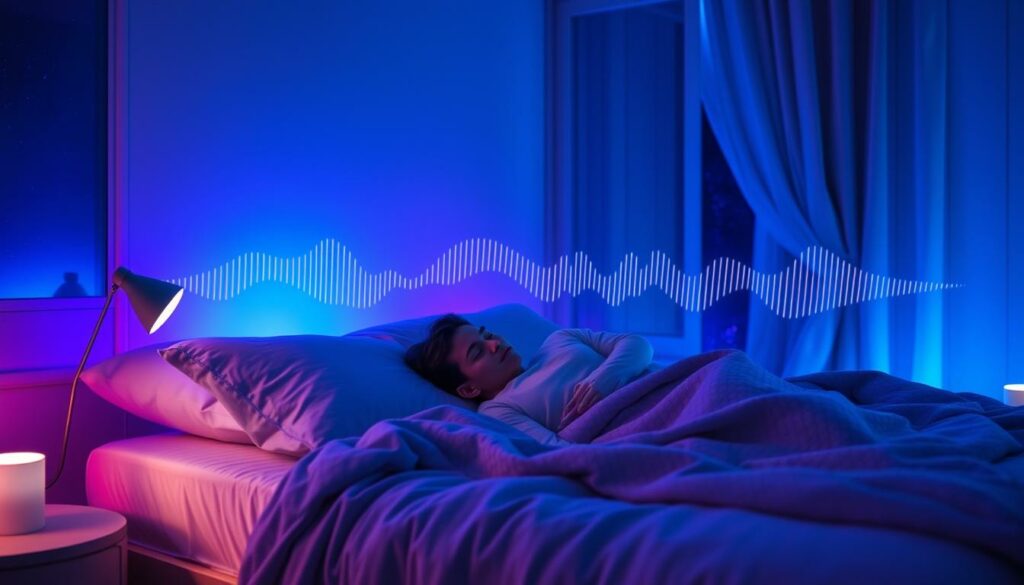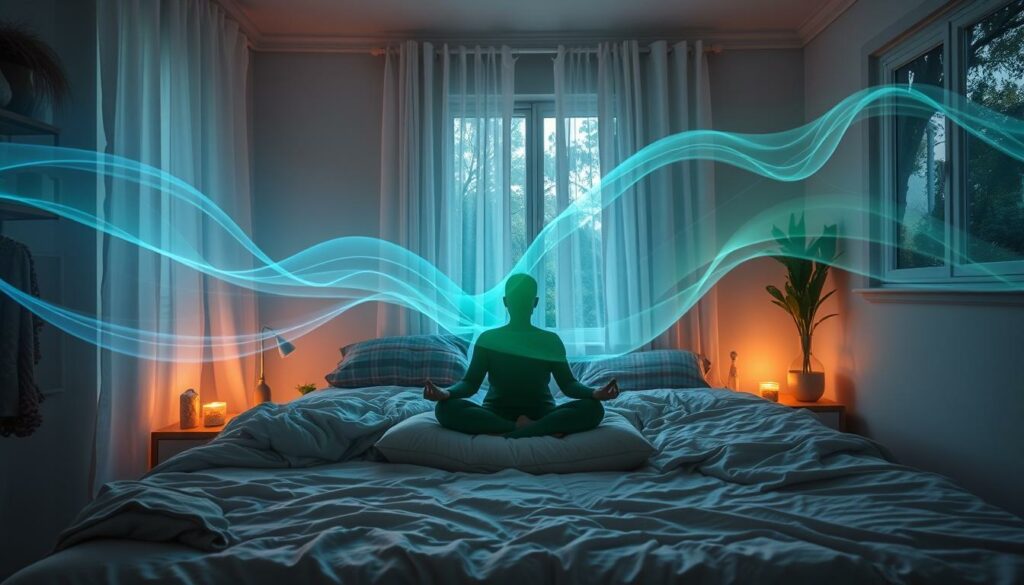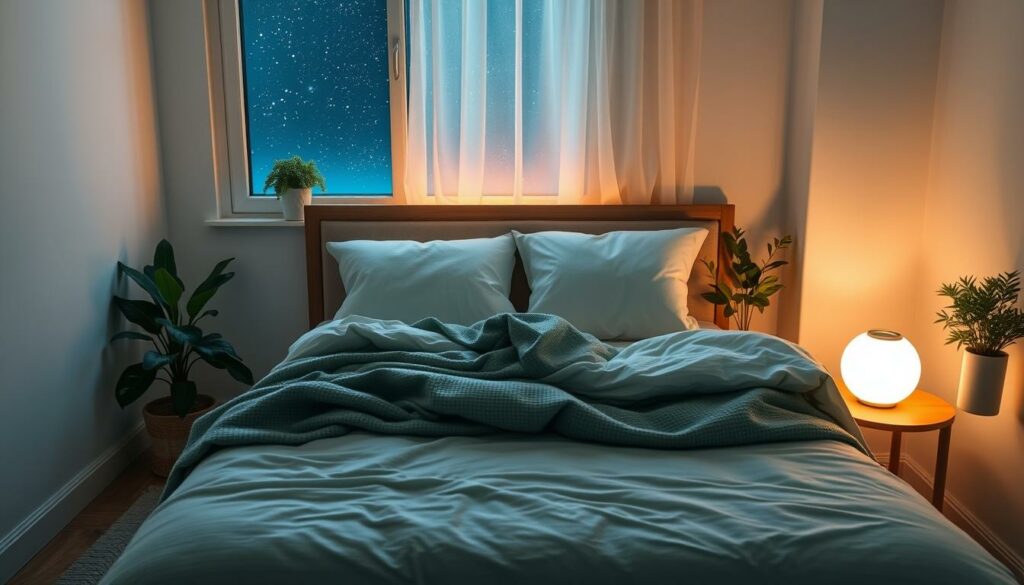Imagine drifting into a peaceful state where worries fade away. A calm silence wraps you like a cozy blanket. This is what a restful night feels like, a break from daily chaos.
Alpha waves sleep helps make this peace possible. They connect being awake to dreaming. These waves, with a frequency of 8 to 12 Hz, are key for rest. They show our minds are getting ready for sleep.
Many people feel more relaxed when alpha waves are active. This happens when they close their eyes and go to sleep. But, about 10% of people don’t have alpha waves. They find it hard to fall asleep.
This article will look at how alpha waves affect sleep. We’ll talk about ways to boost their presence. And we’ll see the health benefits of these brain waves. Let’s start our journey to better sleep and more rest.
Understanding Alpha Waves
Alpha waves are important parts of brain activity when we are relaxed but still awake. They start when we close our eyes and get ready for sleep. This is a time when our brain works but doesn’t have to think hard.
Definition of Alpha Waves
Alpha waves are brain waves that go from 8 to 12 Hz. They start the first stage of sleep. This stage is key for the body to get ready for deeper sleep. So, alpha waves are vital for getting to restful sleep.
Frequency Range and Characteristics
Alpha waves are between 8 and 13 Hz. They help control the brain and are linked to relaxing. When we start to sleep, alpha waves make us feel calm and uplifted. Knowing about these waves helps us understand how sleep affects our well-being.
| Wave Type | Frequency Range (Hz) | Characteristics |
|---|---|---|
| Alpha Waves | 8–12 | Low frequency, associated with relaxation and transition into sleep |
| Theta Waves | 4–8 | Light sleep or relaxation; key for meditative states |
| Delta Waves | 0.5–4 | Deep sleep, dreamless; very high amplitude |
| Beta Waves | 12–30 | Awake states; associated with active thinking |
| Gamma Waves | 25–100 | Linked to learning, problem-solving, and cognitive processing |
Alpha Waves Sleep: The Impact on Sleep Quality

Alpha waves are key to good sleep. They help make sleep restful and restorative. They also help with mental health and sleep disorders.
Role of Alpha Waves in Sleep Stages
Alpha waves help move from light to deep sleep. This is important for recovery and feeling refreshed. But, too much alpha activity can mean sleep is broken, especially for those with sleep issues.
Effects of Alpha Waves on Mental Calmness
Alpha waves make our minds calm, which is key for sleep. They lower stress and make the brain ready for rest. When they work right, we feel peaceful and sleep deeply.
Research Findings on Alpha Waves and Sleep Disorders
Studies link odd alpha wave patterns to sleep problems like insomnia and sleep apnea. People with chronic insomnia have too much alpha activity during sleep. This shows how alpha waves could help treat sleep issues.
How Alpha Waves Affect Brain Function

Alpha waves play a big role in how our brains work while we sleep. They help us move from being awake to being asleep. This shows how important alpha waves are in keeping our sleep healthy.
Brain Wave Patterns During Sleep
As we fall asleep, our brain waves change a lot. Alpha waves start the sleep cycle. Then, they turn into theta waves, and finally, delta waves take over in deep sleep. This shows how alpha waves help start and keep our sleep healthy.
Alpha vs. Other Brain Waves
Alpha waves are special because they help us relax when we’re awake. Delta waves, on the other hand, are the slowest and happen in deep sleep. They help our bodies rest and recover.
Theta waves are for light sleep and deep meditation. Beta waves are for being alert and thinking a lot. This shows how different brain waves do different jobs in our brains.
| Brain Wave Type | Frequency Range (Hz) | Role |
|---|---|---|
| Alpha Waves | 8 – 13 | Calmness and relaxation |
| Theta Waves | 3 – 8 | Light sleep and meditation |
| Delta Waves | 0.5 – 3 | Deep restorative sleep |
| Beta Waves | 12 – 30 | Alertness and cognitive function |
Techniques to Enhance Alpha Waves for Better Sleep

Using effective techniques can make sleep much better. Relaxation and meditation help create a calm state for deep sleep. These practices boost alpha wave production, which is key for good sleep.
Importance of Relaxation Techniques
Deep breathing and progressive muscle relaxation are key for more alpha waves. They calm the brain and reduce stress, making sleep better. Doing these often lowers anxiety and boosts overall health. Some good ways to relax include:
- Deep breathing exercises to calm the mind.
- Progressive muscle relaxation to release physical tension.
- Mindful visualization to foster a peaceful mental state.
Meditation and its Benefits for Alpha Waves
Meditation greatly helps alpha waves. Studies show it increases alpha activity in the brain. It makes the mind calm and helps with sleep.
Regular meditation also lowers beta waves, making it easier to relax. Some effective meditation ways are:
- Mindfulness meditation for present-moment awareness.
- Guided meditations focused on relaxation.
- Binaural beats to synchronize brainwaves and enhance focus.
Improving Sleep Hygiene for Optimal Alpha Waves

Improving sleep habits is key to getting more alpha waves during sleep. This helps you relax and sleep better. Making a few changes can make a big difference in how well you sleep.
Creating a Restful Sleep Environment
A good sleep area has things that help you sleep well. These include:
- Optimal darkness: Less light means fewer wake-ups.
- Cool temperatures: A cooler room helps you sleep deeper.
- Minimized noise: Quiet helps you sleep without interruptions.
Daily Practices to Promote Healthy Sleep Patterns
Having daily routines helps you sleep better. Here are some tips:
- Go to bed and wake up at the same time every day.
- Don’t have caffeine before bed, as it can mess with your sleep.
- Don’t use screens at night, as they can stop your body from making melatonin.
The Role of Light Exposure on Sleep Cycles
Light affects your body clock. Here’s what to do:
- Morning sunlight: Being outside in the morning helps your mood and sleep rhythm.
- Avoiding bright lights in the evening: Dimming lights tells your body it’s time to sleep.
- Using blackout curtains: Darkness in the bedroom helps your body make melatonin, which is good for sleep.
| Aspect | Importance |
|---|---|
| Optimal Darkness | Reduces disruptions to sleep cycles, enhancing alpha waves. |
| Cool Temperatures | Promotes comfort and naturally supports deeper sleep stages. |
| Minimized Noise | Ensures an uninterrupted sleep experience, vital for alpha wave connectivity. |
| Regular Sleep Schedule | Aligns with natural circadian rhythms, improving sleep hygiene. |
| Light Exposure Management | Affects melatonin production, essential for restful sleep cycles. |
Potential Health Benefits of Alpha Waves Sleep
Alpha waves sleep is more than just relaxing. It helps make the brain work better. Studies show that alpha waves in the 8 to 12 Hertz range boost problem-solving and creativity. This can make you more innovative.
Alpha waves also help with mental health. They can lessen depression and anxiety in some people. This leads to a more balanced emotional state and a stronger mind. It may even protect against diseases that harm the brain later on.
There are easy ways to get more alpha waves, like using brainwave entrainment or listening to binaural beats. Getting enough sleep with alpha waves can make your mind healthier. It helps you use your brain to its fullest.
